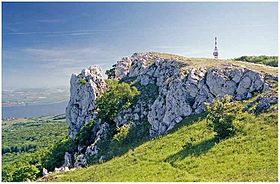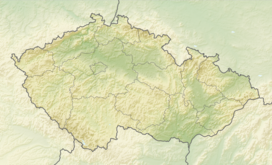Děvín in Moravia (Pavlov Hills)
| Děvín | |
|---|---|

Děvín - summit limestone rock
|
|
| Highest point | |
| Elevation | 549 m (1,801 ft) |
| Prominence | 300 |
| Coordinates | 48°52′10″N 16°38′59″E / 48.86944°N 16.64972°ECoordinates: 48°52′10″N 16°38′59″E / 48.86944°N 16.64972°E |
| Geography | |
| Location | Moravia, Czech Republic |
| Parent range | Pavlovské Hills part Mikulovské |
Děvín German: Mayden Berg; (Girl´s hill or Maiden hill); (549 metres) is the highest (double-peaked) mountain of Pavlov Hills, northern part of (Mikulov Highlands), Moravia Czech Republic. Located nearby of the historical border between Austria and Moravia (9,2 km), and right on trace where runs line of drainage divide of Upper Dyje drainage and Dyje/Morava mesodrainage.
The average annual temperature is about 8,2 °C. A radio and TV transmitter is situated on the top. The lower platform is used as a watcharea. The mountain is also a popular area and hikers goal.
.
The area is rich in historical interest. The summit of Děvín has the remains of a huge Iron Age hill fort, while the ancient Amber Route runs neighbors of the mountains base, and all archaic roads in landscape, originally created by anymals and later owertaken by humans. The area around base of the mountain is permanently settled longer than last 30 000 years. Since Cromagnos hunters, ower Celtic tribes settlement, Roman fortress, Great Moravia hillforts (Strachotín and Děvín). The Venus of Dolní Věstonice is a Venus figurine, a ceramic statuette of a nude female figure dated to 29,000–25,000 BCE (Gravettian industry), which was found at a Paleolithic site in the Moravian basin south of Brno. In the base of Děvín Mountain 549 metres (1,801 ft). This figurine, together with a few others from nearby locations, is the oldest known ceramic article in the world.
...
Wikipedia

